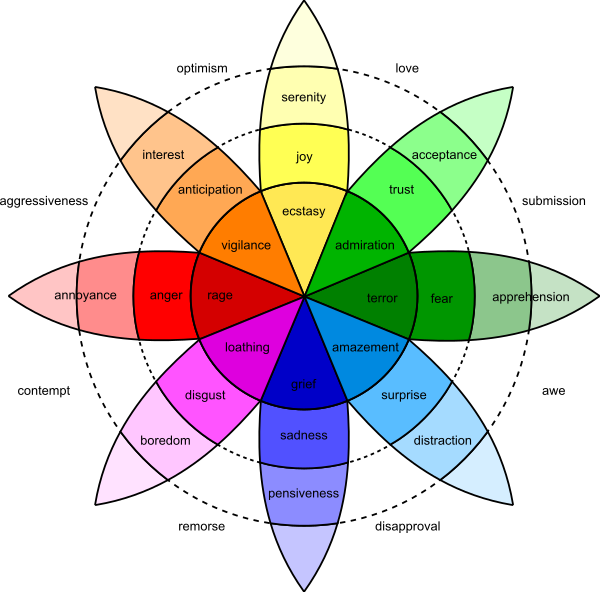Writing Help – Different Emotions

One of the hardest things to do in writing is to describe something that can not be properly described: emotions. We can bond over feelings and understand the basics of anger, disgust or sadness, and yet every person experiences emotions and feelings differently. It’s a challenge to not only properly express what your character (or yourself) are feeling when writing, even more so when you really want to get your readers invested in your character’s emotions.
To assist you in finding the perfect word or phrase for the feeling you want to portray, or even to help you flesh out the emotional range of your characters, we have gathered some information about basic emotions as well as feelings you may have but do not know how to express properly.
Express Different Emotions
Emotions can be not only categorized, but also contrasted. Every emotion has a counterpart it contrasts with. Without going deeper into the psychology of this, let’s have a look at the “Wheel of Emotions” established by Robert Plutchik, a psychologist, and researcher in the field of emotion.

As we can see, this wheel contrasts the most well-known emotions in a sometimes comprehensible, but sometimes also surprising way. While the contrast between joy and sadness seems obvious, would you have thought that the opposite of fear would be anger?
If you are interested in the psychology and theory behind this, we encourage you to read Plutchik’s paper The Nature of Emotions.
Looking at the Wheel of emotions from a writer’s perspective can help to fine-grain emotions you want to portray in your writing. On one hand, it gives a neat, short overview of the eight “basic” and eight “derivative” emotions of the human being. On the other hand, it helps to contrast characters with different characterizing emotions as well as setting up scenes and roles by choosing contrasting feelings for protagonist and antagonist, hero and villain.
Instead of a pure list, the wheel gives a practical, color-coded overview that is easier to remember and helps to quickly distinguish the emotion you are looking for.
How To Portray Emotions In Writing
Of course, you can blatantly state the emotions of your character, but how convincing is this? You want your readers to get drawn into your story, to understand what your character feels, to be invested in what is going on. This can not be achieved by blatantly stating: “He is sad”.
Show, don’t tell is the motto here. Can you portray the mood of a character or even a whole scenery by showing the emotions instead of stating them? Then do so! Explain all the effects of the feeling, the thoughts your character may have because of them, how their actions are affected, how they see things, how things change for them.
Emotions We Feel But Can’t Explain
We all know anger and sadness, joy and disgust, boredom and anticipation. But what about those complex feelings we have that can either not be explained properly or need just so many words to be expressed?
If you browse the web, you will find many lists with feelings that you feel from time to time and that actually have one word to describe them, oftentimes borrowed from other languages. Below, we have gathered some of the, for us, most interesting and intriguing:
- Adronitis: The frustration you feel about how long it takes to befriend someone
- Anemoia: A nostalgic feeling for a time you haven’t even lived in or known
- Clinomania: The strong desire to stay in bed (note: not asleep)
- Dysania: The feeling of, despite being refreshed and energize, not being able to get out of bed
- Lachesism: A strong desire to be struck by a disaster like a car crash or natural catastrophe
- Liberosis: The desire to care less about something
- Monachopsis: The subtle feeling that you are out of place
- Rubatosis: The awareness of your own heartbeat, breathing or even blinking which can be slightly unsettling
And last but not least, there is one term brought back into existence in Mark Forsyth’s book “The Horologicon: A Day’s Jaunt Through the Lost Words of the English Language”: Finifugal.
As a reader (or passionate watcher of TV series) you are familiar to this feeling, probably without even realizing it. Finifugal describes the fear of something coming to an end. This can be a book, a series, a vacation or trip, or even the end of a week.
For more, check out this list of 40 emotions by The Thought Catalog.
